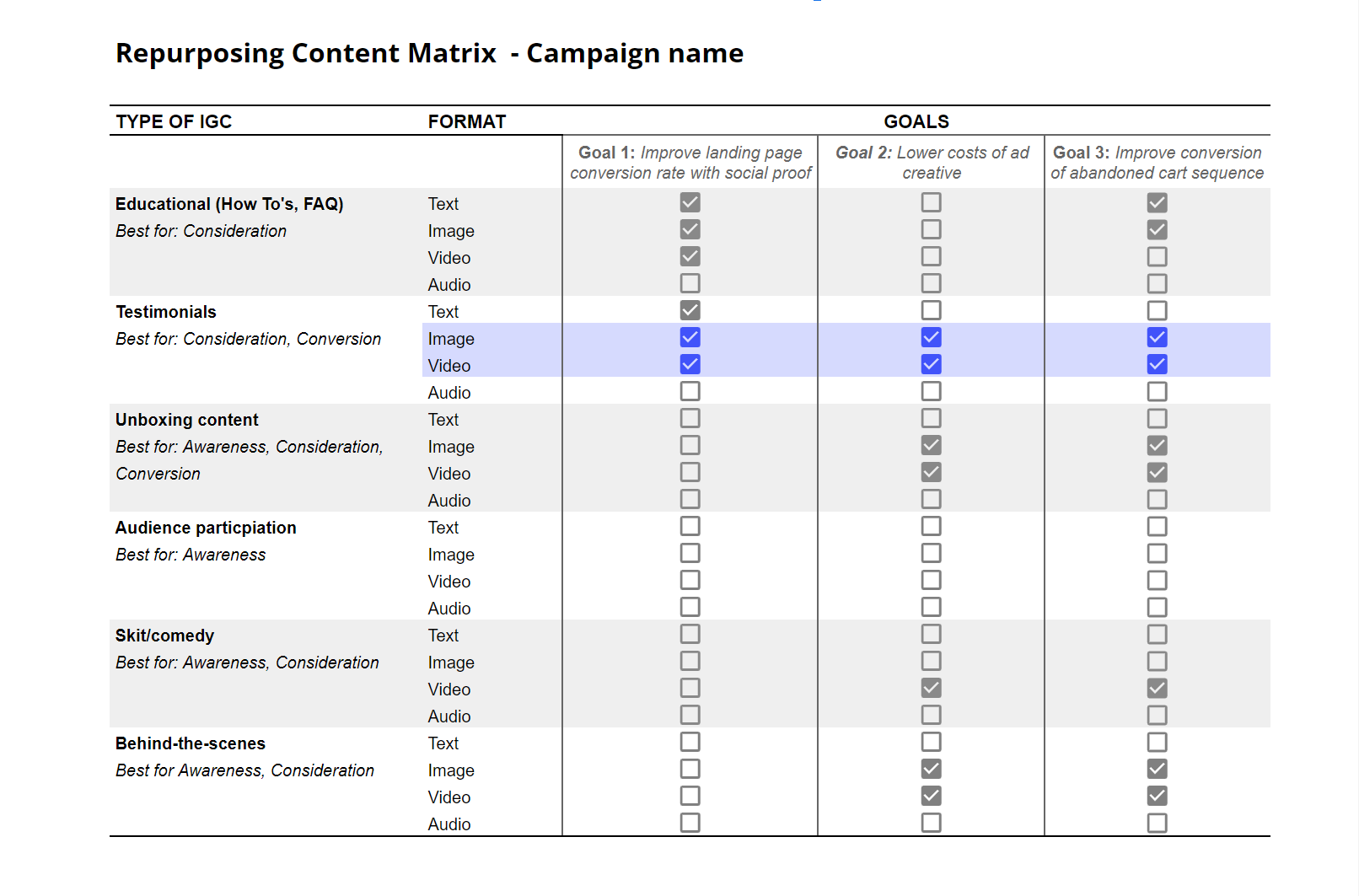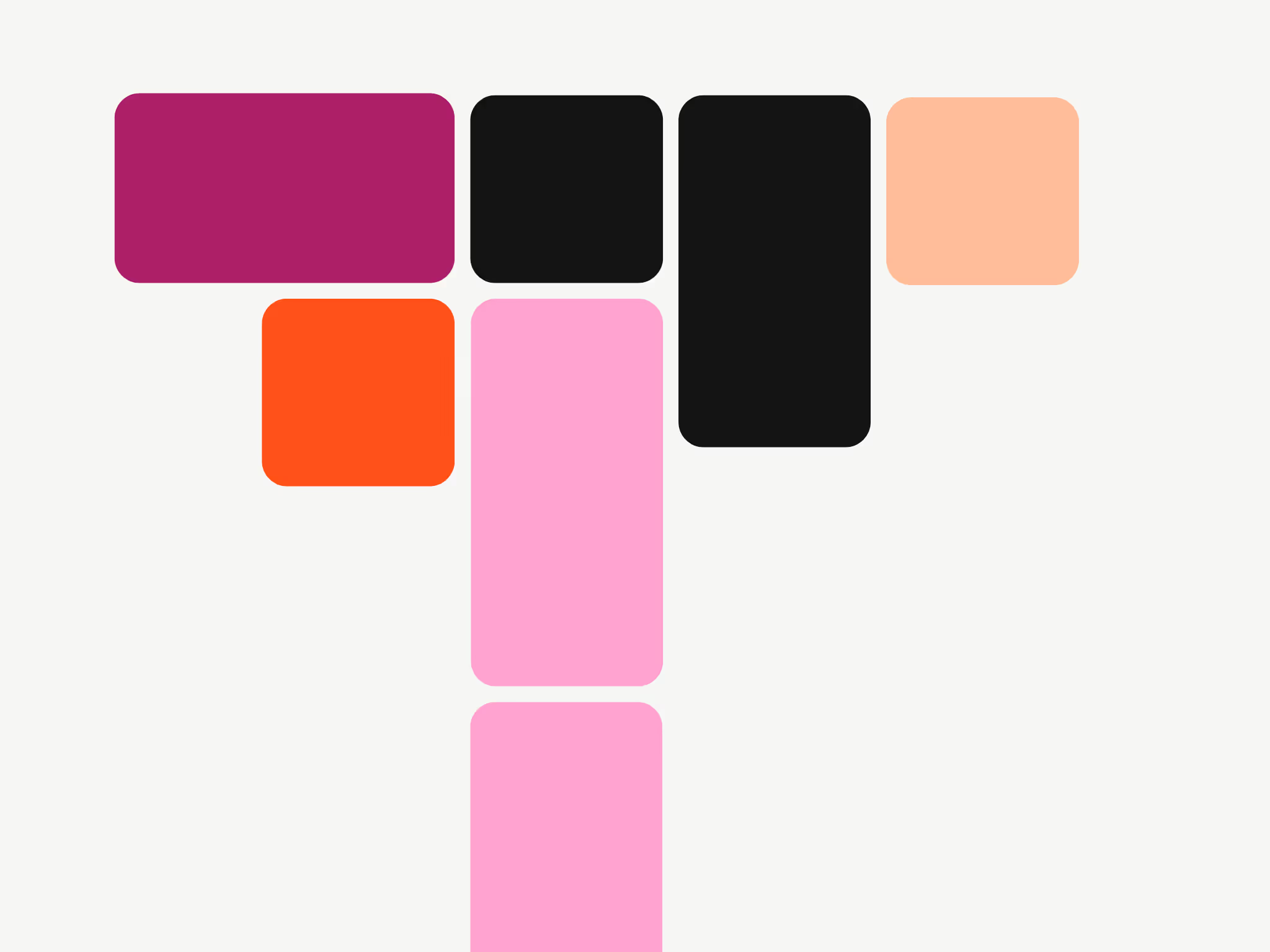In a world where everyone (and their very cute pets) are vying for our attention, and everyone else is scrolling to infinity, how does a brand keep up?
How do you make as much quality content as possible, as affordably as possible? How do you make sure all of your distribution channels have enough content to keep your brand top of mind? How do you make sure that the budget you’re putting behind content creation has a good return on investment?
And how do you do all of that at scale?
The answer is in repurposing influencer-generated content.
Influencers know how social media works better than anyone. But the content they create for brands is often used once and forgotten, never to be seen again.
Using influencer marketing as a single distributed piece of content is bonkers. Because, when planned strategically, influencer marketing can solve all your content creation and distribution problems. And do it at a fraction of the cost of traditional practices.
Keep reading to discover how to repurpose content strategically and not just as an afterthought.
Waste not, want not: 7 ways to reuse or repurpose influencer-generated content with examples
1. Reposting IGC on brand social channels
Let’s start with one of the easiest ways to reuse influencer content: the repost. Just because it’s easy though, doesn’t mean it doesn’t need a strategy.
In a survey, Facebook found that the Instagram feed is commonly used as a place to discover new brands while Stories are where users go to learn more about products and brands.
With this understanding, you can use your influencer-generated content in a more thoughtful way. You want your top-of-the-funnel, demand generation content to be prominent on your feed. And you want middle-of-the-funnel, education-type content in your stories. This way you’re providing your audience with what they expect to see in those places.
Each time you consider what kind of content you want influencers to create for a campaign, you should also be considering what you’re missing, and where and how you’ll repost it.
Are usage rights required: No, as long as you tag the influencer and mention them in the caption.
2. Repurposing IGC as paid creative/social ads
Are you running social ads? Do you have content for those ads?
Using influencer content as creative for social ads is a great way to amplify content already doing well organically. As a bonus, using IGC as paid social ads is one way to measure the impact of a campaign or even the ROI of influencer marketing in general.
For example, you can run tests to see how IGC performs against or combined with branded content on awareness, reach, or sales. You can also see which creator partners perform better and commit to longer-term collaborations with those that do.
Olive oil company Brightland wanted to understand whether using content from micro-creators alongside branded content in their social ad campaigns would drive more online sales.
They saw an increase of 25% more attributed purchases with IGC and branded content combined, and a 20% lower cost per purchase, too.
When you’re commissioning an influencer to create content for a Feed, Story, Video, or all three, there are multiple ways to reuse that content as paid creative, including:
- A single video
- A single photo
- A multi-photo carousel from the same influencer or different influencers
Here’s an example from beauty brand Korres where they have reused Emma Abrahamson’s video as the creative for a sponsored post across Facebook, Instagram, Audience Network, and Messenger.

Images or short videos work well for ads as they can easily be reused as they are.
All you need to do is create the copy and put some ad spend behind them. Then, boost the content through your branded account or boost it through the influencer’s account (also known as whitelisting influencer content).
Are usage rights required? Yes, content for commercial intent requires usage rights.
3. Reusing IGC as visuals for your website and blog posts
Influencer-generated content is usually high in both quality and in authenticity. So, it’s almost criminal to commission it and only use it once. Another way to reuse your highest quality IGC is on your website and/or blog.
Take a look at this example from PuraVida who partnered with digital creator Ashlee Bock. Ashlee posted an image to her feed and then the PuraVida team reused it (as is) to enrich the home page of their website.

Influencers can produce studio-like content at a fraction of the cost. Repurpose those images in as many places as makes sense.
Are usage rights required: Yes
Repurposing IGC as reviews on your website
Repurposing IGC as a review or testimonial by an influencer in your space is social proof on steroids.
For example, in a former iteration of Wistia’s pricing page, they used a review by marketing influencer Rand Fishkin. Wistia’s core audience is marketing teams and by using someone who the audience recognizes, they gain so much credence. With higher trust comes a greater likelihood they’ll choose you!

We see a similar example from Eight Sleep, an innovative mattress company that partners with leading athletes and neuroscientists for IGC. Eight Sleep’s main positioning is that sleep is the most important factor for mind and body health. So, they use influencers who can speak to that.
A testimonial from neuroscientist and host of the Huberman Lab podcast, Andrew Huberman carries a lot more weight in this context than a testimonial from Rand Fishkin would. You can’t buy the amount of trust a brand gets when a person an audience recognizes, relates to, or admires gives their stamp of approval.

You can’t buy the amount of trust a brand gets when a person an audience recognizes, relates to, or admires gives their stamp of approval.
It’s simple to repurpose IGC into a review or a testimonial. Reuse images your influencers create for their feed, slap on a caption they used, or something positive they’ve said about your brand, and you’re done!
Are usage rights required? Yes.
5. Repurposing IGC as case studies on your website
Similar to reviews or testimonials, case studies are the epitome of social proof, especially for products that come with higher price tags.
The creators you work with, use your product and experience its value. They’re the people perfectly positioned to showcase that value to potential customers.
Creating a case study from influencer-generated content requires more effort to repurpose than other ideas in this list, but it’s worth it.
Ask influencers to create content that:
- Describes the problem they were facing, what else they tried, and how it made them feel.
- Describes how they use your product and how it felt getting started.
- Describes the results.
This can be in any format: text, images, videos, audio, or illustrations, whatever matches your brand and the influencer’s style.
Now you can repurpose this content into a written case study. Use images and video clips for additional information. Or, repost it as it is on your website as a video.
Are usage rights required? Yes.
6. Repurposing IGC as content for email campaigns
Another way to reuse and repurpose IGC is across email campaigns. Depending on the sequence, you can repurpose IGC as supporting visuals or social proof.
An eCommerce company could reuse influencer-generated content in some of their email sequences, like this:
- In a welcome sequence: Include a video from an influencer using your product.
- Abandoned cart sequence: Add IGC to the end of one email as social proof.
- Site abandonment sequence: Use content from different influencers showing how they use your product.
Here’s an example of how Urban Outfitters used IGC from Instagram to create an email to get customers back on their website. Chances are it took them less than an hour to put this together.
7. Repurposing IGC for packaging and inserts
For eCommerce, you can also use your influencer-generated content to spice up packaging, inserts, and the overall unboxing experience. Using IGC in this way has two benefits: one for your influencer relationships, and one for your customers.
For your customers, seeing influencers they recognize and like included in inserts almost brings the relationship to real life, creating a more intimate experience. It could even inspire them to document or capture the insert, creating more content for your brand.
On the other hand, asking your influencers to use their content for packaging shows them how much you value their work. By using their image in your packaging, you’re helping them grow their own brand and following.
Nurturing relationships and helping influencers reach their goals is one of the best ways to create a long-term relationship. Long-term relationships strengthen trust with their audience and help you get the most out of your influencer marketing.
Are usage rights required? Sure are!
How to boost ROI by running a repurposing campaign
By reusing influencer-generated across campaigns and channels, you’re making every dollar of your hard-fought budget work smarter for you.
So why not run a campaign with the primary goal of collecting content to repurpose?
You won’t only get lots of content but you’ll also add one more metric you can use to prove ROI.
Here’s how to organize a repurposing campaign:
Step 1: Identify content goals for the campaign
Depending on your team structure, one of the fastest ways to get a repurposing campaign off the ground is to go directly to the managers responsible for other types of content, channels, or customer journey.
Set up a meeting to find out their goals and how IGC might help.
Some example questions you can use in the meeting:
- What kind of content do you find you’re constantly looking to create?
- Is there a customer path that is lacking social proof?
- Would video content be useful for your channel?
- Is there something that needs a refresh?
The meeting will give you the info you can use to guide your strategy. For example, here are a few hypothetical examples you could get.
- Content marketing needs more social proof for a few landing pages
- PPC is trying to find ways to lower the costs of ad
- Email marketing needs to increase the conversion rate from abandoned cart sequences from 4% to 5%.
How do you know what type of content will solve these 3 issues?
We’ve created the Repurposing Influencer Content Matrix that can help. Using 2 criteria to help us find similarities between goals, you can do this exercise very quickly. And it will reveal what type of content will work for your goals.
Get the Influencer Content Repurposing Matrix

This example shows that Testimonials (formatted in images or videos) could be used by all teams and repurposed on landing pages, in social ads, and in emails.
Now you know the kind of usage rights to ask for.
Step 2: Get permissions & usage rights
The single most important part of a repurposing campaign is licensing. Without suitable usage rights, you’ll be walking into potential legal problems. For the uninitiated, usage rights are licenses that allow a brand to “rent” a creator’s content for a fee. In cases where you want to own the content created by influencers outright, you’ll be asking for a buyout and the price will reflect that.
Other factors that impact fees:
- Tier of influencer: Are they nano, micro, mid, macro, or mega influencers? Generally, higher-tiered influencers demand higher pay.
- Placement: Where will you use the content? Is this for a specific market (U.S) or worldwide? Which channels will you use the content on?
- Format: Is it text, images, video, or audio? Photography, illustration, knitting?
- Duration: How long will you use the content? Between 1-3 months is the average and influencers will often include these usage rights in the baseline cost. For usage right with a duration of over 3 months, the costs will rise.
As you prepare influencer contracts, you'll also want to consider the type of usage rights you need. Will the content be used for editorial or commercial purposes or both? Do you require exclusivity of the content? Make sure all your ducks are in a row and don’t take the risk and repurpose an influencer’s content without permission.
Consult an attorney to understand the usage rights that exist in your country of business.
Disclaimer: This is intended for informational purposes only and should NOT be considered legal advice.
Step 3: Brief your influencers
You know the drill. Just like other campaigns, once you have contracts and briefs in place, you’ll work with your influencers and launch the campaign!
Step 4: Track and collect influencer-generated content
Now comes the part where all your hard work starts to pay off: your creator partners are posting content across social media channels.
An influencer monitoring tool like Modash makes the process of content tracking and collection simple. Bonus: you can add other team members, in this case, the leads of other teams, who can quickly scroll through and choose the exact content they want to repurpose.
Here’s how it looks in Modash. You can see published content in a gallery view and sort by date, influencer, or alerts.

Step 5: Editing IGC for different channels in different formats
Every social media platform has a different set of users and contexts. TikTok is for entertaining skits and conversations. LinkedIn is for networking for work and sharing our expertise. Twitch is the gaming space, Facebook is where we look for our friends’ updates, Instagram is curated photos we want to buy from, and we go to YouTube for long-form videos.
When repurposing content for other platforms, you’ll want to keep this in mind. Some IGC will need to be resized to fit natively on other channels. You might want to add your logo and a few graphic elements, or even audio.
Always adjust your IGC to suit the platform.
Boosting ROI from influencer-generated content
Don’t just settle for one-and-done influencer campaigns. Take some time to plan a repurposing strategy and you’ll improve the ROI of your influencer marketing efforts. Guaranteed.








